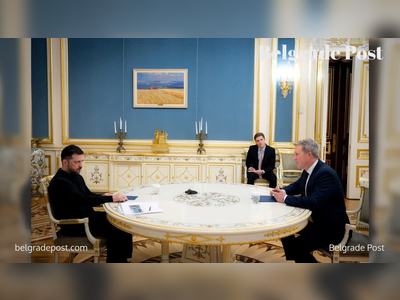European Markets Under Pressure: Germany Alters Fiscal Rules, Defense Companies Face Decline
Investor sentiment navigates Germany's historic fiscal reform amidst ongoing concerns about Ukraine ceasefire negotiations.
European markets exhibited mixed results on Wednesday as investors scrutinized Germany's historic fiscal reform and developments related to a potential ceasefire in Ukraine.
Concurrently, markets awaited crucial monetary decisions from various central banks.
The STOXX 600 index registered slight changes in morning trading in London, with most sectors and major exchanges trending negatively.
The German DAX fell by 0.4%, having previously recovered from earlier losses.
This decline follows a vote on Tuesday by German lawmakers approving reforms to public debt rules, enabling increased national defense expenditure and the establishment of a €500 billion climate and infrastructure fund.
Despite a 17% rise in the DAX since the beginning of the year, the index faced the prospect of breaking a three-day streak of gains.
German defense companies experienced declines in share value even after the parliament approved a substantial fiscal package to boost defense spending.
Rheinmetall, one of the major beneficiaries in the Stoxx 600 on Tuesday, lost 6.3%.
Renk Group saw a decline of 10%, while Hensoldt fell by 8.5%.
Although investors anticipated that the increased government spending would rapidly benefit these companies, analysts caution that it will take time before contracts are realized and reflected in profitability.
In Spain, BBVA announced that the Central Bank of Morocco has approved the transfer of control over its Banco Sabadell branch, marking a significant step towards a hostile takeover of Banco Sabadell.
BBVA awaits approval from the Spanish Competition Commission, which is examining the potential implications of this merger for the domestic banking sector.
CEO Onur Genç stated that the banks had proposed a range of compensatory measures to ensure market competitiveness and anticipated receiving a green light in the coming weeks.
However, Banco Sabadell has strongly opposed the takeover, with its CEO César González-Bueno highlighting last month that the merger would reduce competition and that BBVA's offer was inadequate.
Meanwhile, hedge fund Palliser Capital's request for mining giant Rio Tinto to unify its two dual-listed companies into a single Australian holding entity was rejected by the board.
Rio Tinto operates through Rio Tinto PLC, listed in London, and Rio Tinto Limited, listed in Australia.
Both companies have the same board members but operate separately.
Palliser contends that this structure has eroded around $50 billion in shareholder value over the past three decades, a claim that Rio Tinto dismissed as "unfounded and misleading."
In the United Kingdom, the Bank of England is expected to maintain its benchmark interest rate at 4.5% during a meeting on Thursday as the British economy grapples with global challenges.
Key factors influencing this decision include the unpredictability of Donald Trump's trade tariffs, the potential onset of a global trade war, and inflationary pressures within the UK. The Bank of England is anticipated to refrain from hastily altering monetary policy until gaining a clearer perspective on global economic trends.
Concurrently, markets awaited crucial monetary decisions from various central banks.
The STOXX 600 index registered slight changes in morning trading in London, with most sectors and major exchanges trending negatively.
The German DAX fell by 0.4%, having previously recovered from earlier losses.
This decline follows a vote on Tuesday by German lawmakers approving reforms to public debt rules, enabling increased national defense expenditure and the establishment of a €500 billion climate and infrastructure fund.
Despite a 17% rise in the DAX since the beginning of the year, the index faced the prospect of breaking a three-day streak of gains.
German defense companies experienced declines in share value even after the parliament approved a substantial fiscal package to boost defense spending.
Rheinmetall, one of the major beneficiaries in the Stoxx 600 on Tuesday, lost 6.3%.
Renk Group saw a decline of 10%, while Hensoldt fell by 8.5%.
Although investors anticipated that the increased government spending would rapidly benefit these companies, analysts caution that it will take time before contracts are realized and reflected in profitability.
In Spain, BBVA announced that the Central Bank of Morocco has approved the transfer of control over its Banco Sabadell branch, marking a significant step towards a hostile takeover of Banco Sabadell.
BBVA awaits approval from the Spanish Competition Commission, which is examining the potential implications of this merger for the domestic banking sector.
CEO Onur Genç stated that the banks had proposed a range of compensatory measures to ensure market competitiveness and anticipated receiving a green light in the coming weeks.
However, Banco Sabadell has strongly opposed the takeover, with its CEO César González-Bueno highlighting last month that the merger would reduce competition and that BBVA's offer was inadequate.
Meanwhile, hedge fund Palliser Capital's request for mining giant Rio Tinto to unify its two dual-listed companies into a single Australian holding entity was rejected by the board.
Rio Tinto operates through Rio Tinto PLC, listed in London, and Rio Tinto Limited, listed in Australia.
Both companies have the same board members but operate separately.
Palliser contends that this structure has eroded around $50 billion in shareholder value over the past three decades, a claim that Rio Tinto dismissed as "unfounded and misleading."
In the United Kingdom, the Bank of England is expected to maintain its benchmark interest rate at 4.5% during a meeting on Thursday as the British economy grapples with global challenges.
Key factors influencing this decision include the unpredictability of Donald Trump's trade tariffs, the potential onset of a global trade war, and inflationary pressures within the UK. The Bank of England is anticipated to refrain from hastily altering monetary policy until gaining a clearer perspective on global economic trends.
AI Disclaimer: An advanced artificial intelligence (AI) system generated the content of this page on its own. This innovative technology conducts extensive research from a variety of reliable sources, performs rigorous fact-checking and verification, cleans up and balances biased or manipulated content, and presents a minimal factual summary that is just enough yet essential for you to function as an informed and educated citizen. Please keep in mind, however, that this system is an evolving technology, and as a result, the article may contain accidental inaccuracies or errors. We urge you to help us improve our site by reporting any inaccuracies you find using the "Contact Us" link at the bottom of this page. Your helpful feedback helps us improve our system and deliver more precise content. When you find an article of interest here, please look for the full and extensive coverage of this topic in traditional news sources, as they are written by professional journalists that we try to support, not replace. We appreciate your understanding and assistance.










